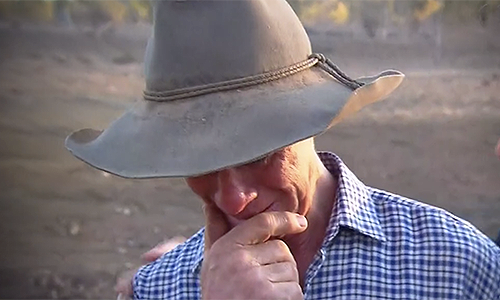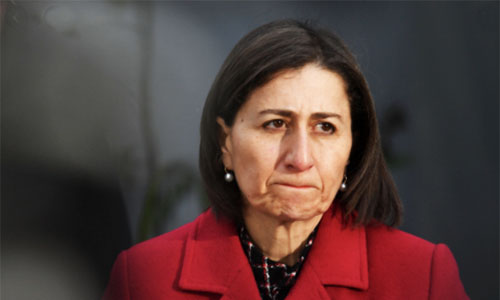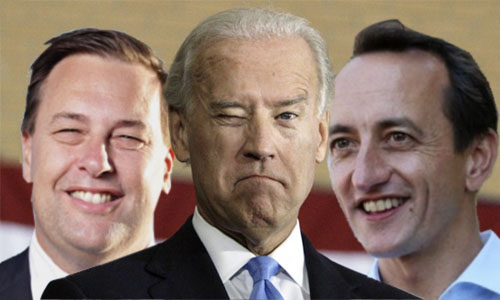
by ROGER CROOK – I HAVE just received a nice note from WA Premier Roger Cook to tell me he’s going to return some money I gave him in the first place; he hopes it will help pay our electricity bill.
(His note was signed “Roger”; such familiarity, I hardly know the man – at least he didn’t put “love, Roger”!)
- How long could we last if food imports stopped?
- Australia is no longer the land of plenty; the land of milk and honey.
- Why on earth are supermarkets sourcing peaches and beetroot from China?
I would prefer if he stopped playing this game of giving our money back to us, and just got the price of electricity, and gas for that matter, back into the realms of being internationally competitive, enabling Australian industries to compete with the rest of the world again.
If he did that, he would help his boss in Canberra turn his dreams of “Future Made in Australia” into a reality; but not by throwing a billion at solar panels and quantum computers; I have a far, far better idea.
How about a national program that would reinvigorate Australian agriculture, breathe new life into regional towns and achieve “food security” for Australia?
Food security? Let me explain why food security is important and like fuel security, remains ignored by this and all previous governments.
To understand the importance of food security we only have to look back in history to1939 when Hitler blockaded the Atlantic Ocean in an attempt to starve Britain into surrender.
Britain became dependent on imported food after the repeal of the Corn Laws in 1846, and to this day remains dependent on imported food for about half of what it consumes.
If it hadn’t been for the might and bravery of the British Merchant Navy, something Australia doesn’t have; the Royal Navy together the capacity and will of America and members of the old British Empire, the closing of the Atlantic would indeed have starved Britain into submission.
Der Fuhrer would have achieved his stated ambition of residing in Buckingham Palace.
In 1939 Britain didn’t have fuel security either, but that’s for another day.
FOOD
Most of our daily food is provided to us through the labour of farmers, food processors and our substantial haulage industry. Three integral parts of a hard working Australian agriculture.
One of those parts is failing and being replaced, yet again, from overseas.
What the people of Australia must be made aware of, is that this country is increasingly becoming dependent on imported food.
Food security asks the question, “How long could we last if food imports stopped?”
The very idea that we don’t produce all the food we need seems to be contrary to the perception that most have, that is that we produce all the food we need and export what we don’t.
We have all grown up believing that Australia is the land of plenty; the land of milk and honey; well, it isn’t, not anymore.
We do grow and export enough food to feed many millions more than our own, but it is in the form of calories; calories in the form of grains, oil seeds and meat; the food we export is classified as unimproved.
The food we are now importing in ever increasing quantities is improved or processed food. Food that has had something done to it, wheat into pasta, tomatoes and peaches into tins.
In other words, the food you see on the supermarket shelves and in their fridges and freezers in tins, bottles, packets and jars.
It is important to recognise and celebrate that almost all the fresh food we eat (fruit, vegetables and meat is grown in Australia). It is the best in the world, and it arrives in the shops after little time in storage or on a truck.
CRAVINGS
What fresh food we do import is mainly to satisfy our out-of-season cravings.
We are blessed that we live in a country that stretches from the tropics to the temperate, and so there is really nothing we cannot grow, and the potential to grow more is limitless.
The objective then becomes “import replacement”.
Food security is not about reimposing tariffs or ignoring Free Trade Agreements; it is about sensibly looking at food production and processing and then developing a strategy that would ensure we can survive, if for any reason the shipping lanes on which we depend are closed for more than a few weeks.
Is that likely? I discussed a few weeks ago the “choke points” for shipping and how they can interfere with global trade if they are closed. We are seeing this now with the Red Sea and the Suez Canal.
It has taken an American battle fleet and a coalition of navies from around the world to prevent a mob of rebels in Yemen from closing that vital link to Europe.
It would only need for the Suez Canal to be closed and/or the South China Sea to become difficult to navigate due to China’s aggression towards the Philippines or Taiwan, for Australia’s food and fuel imports to be seriously affected.
IMPORTS
In 2021-22 we imported food to the value of $24.3b, up 15 per cent on the previous year. The value of the food (calories) we exported was nearly $60b, it was a good year for grain farmers, because their exports were up 28 per cent on the previous year.
The food we import has been grown, processed, packed and transported, primarily by sea, from the other side of the world. It arrives on our shelves and is invariably highly competitive on price with the ever decreasing amount of Australian processed food. A prime example is tinned tomatoes.
Is there a better country in the world for growing tomatoes than Australia? Probably not. Certainly, the Australian climate, somewhere, can produce tomatoes twelve months of the year.
Why is it then that Italians enjoy a 70 per cent market share, worth about $119m of the tinned tomato market in Australia? We see it all the time, Ardmona against a selection of Italian product and the Australian product almost always beaten on price.
This last week (I am the designated shopper at the moment) I was looking for some tinned or bottled fruit. On the shelves I found two displays of peaches with identical packaging. One was from Ardmona, Australian of course; the other was Woolworths house brand from China, of all places.
I searched a little more and found on the internet that the same company, Woolworths, have, or have had beetroot, of all things, in tins from China and would you believe from Vietnam?
What on earth is the major food supermarket in Australia doing buying peaches and beetroot from China? What else have they bought? Are we not reliant enough on China already with having to rely on it for food?
WHY?
The reason why we are buying ever increasing amounts from other counties is quite simple; it was laid out chapter and verse by Eli Greenblat in The Australian newspaper on May 8; the answer is that Australia is one of the costliest countries in the world in which to do business.
Global giants like Proctor & Gamble, Mars and Unilever are claiming that gas bills have gone up by 300 per cent, wages and freight increasing by 11 per cent annually.
The maker of the Kellogg’s brands, Nutrigrain and Pringles, claims Australia is a “challenging” place in which to do business.
I have noticed that a cereal called Shredded Wheat is imported, I think from America. Importing grain products into Australia from America, is like taking coal to Newcastle.
Australia grows some of the best Durum wheat in the world, the majority of which we export. Duram is the best wheat for pasta.
A search along the shelves for the country or origin of the vast range of pasta that is available in all our shops, will confirm that the home of pasta, Italy, enjoys substantial shelf space. We grow the wheat, and we import the pasta.
Virtually all of the processed pig meat we eat, bacon, ham of all kinds is imported. Last year, from The Netherlands to the value of $93m and from America, $201m was imported into Australia.
Australia imports about 70 per cent of all the fish we eat. We are an island nation surrounded by oceans which other people fish, yet we import most of the fish we eat.
I don’t understand that, especially when a lot of that imported fish is from New Zealand; perhaps they “fish the ditch”?
We have a Free Trade Agreement with our cousins “over the ditch”. That FTA has been in place for a long time. As we watch the decline of our dairy industry, our imports of dairy products are increasing, not only from New Zealand, but also from Europe.
A search of the labels in the frozen food section will reveal the extent of our reliance on imports of frozen vegetables from the land of the long white cloud. Why do we import so many potato products from New Zealand?
There is a dark side to those vegetable imports. Whether it’s still the case I don’t know, and I haven’t searched the fridges recently. What I do know is that in the past, New Zealand somewhat abused that FTA by importing frozen veggies from China, repackaging it and sending it here; so “Product of China packaged in NZ” for sale in Australia!
It’s not just the food manufacturers who consider Australia an expensive place to do business; Orica CEO Sanjeev Ghandi recently warned us that we are going to lose more manufacturing if we don’t get gas prices under control.
Ghandi said he had invested $1.5b in assets in the past six months, none of it in Australia.
He went on to say that in the past ten years gas prices had tripled in Australia, while they are at record lows in America.
All manufacturing in this country is struggling with energy costs and urgent action needs to be taken.
Ghandi also warned that energy intensive industries in Australia were “genuinely living on the brink” after the collapse of Qenos, the plastics manufacturer.
WRONG
It could be construed from the Greenblat article that the complaints of the food processors like Unilever and Proctor & Gamble is something new, it’s not, it’s been going on for years and it’s getting worse.
The Australian food processing industry is a mere shell of what it used to be. Over the past 20 years food processors in their droves have either closed down or moved overseas, companies like Heinz and Simplot no longer live here.
The famous landmark Heinz tomato sauce is no longer made in Australia with Australian tomatoes; same goes for all of their tomato products. I understand their famous baked beans are now imported into Australia; goodness knows where the beans are grown.
The recent claim by major multinational companies that Australia is an expensive place in which to do business, is not a new claim.
First it was the food processors, now it is the general manufacturing sector which is raising the white flag.
Over the decades the Iack of federal government awareness and concern for the future of Australian agriculture has affected not only the growers of food, who have seen their markets grow smaller; it has affected the regional centres where most of the food processing took place.
Unemployment is a constant challenge in regional Australia. Seasonal work at harvest for a short period of time creates opportunities for back-packers and encourages the resident young people to move to the city because they can’t see a future in the regions.
Throughout rural Australia there has been a decline in population. Mixed farms, farms that produced for the likes of Heinz and Simplot changed in favour of monoculture systems, like cereal growing and grazing; vegetables to beef; from improved like vegetables to unimproved like beef.
The changes forced on agriculture by being among the most expensive countries in the world to do business, has opened the doors to others from other countries to fill the gaps and feed the Australian people.
New Zealand, America and the EU have been the main beneficiaries of the decline in food processing and manufacturing in Australia.
Those three advanced economies sell to Australia, at a profit, food worth over $12b a year, remember that is the value of the landed product not the retail value.
Hawke and Keating removed tariff protection and many Australian industries suffered. Paul Keating believed he was creating a level playing field, it was a myth.
There never has been a level playing field in world agriculture and there still isn’t. World-wide about US$560b a year is paid in agricultural subsidies direct to the producer; that’s US$1.5b a day. That is the competition Australian producers face.
The only so-called subsidies Australian producers receive is the rebate on diesel.
Keating removed all the tariff protection that farmers and processors received and failed to recognise that the rest of the world didn’t follow; Keating in effect threw Australian farmers and food processors under the bus.
This hit from within came after the catastrophe of Britain entering the Common Market in 1970. When that happened Australian butter exports dropped by 90 per cent. Apple sales dropped from 86,000 tonnes in 1975 to 27,000 tonnes in 1990. Canned and dried fruits also suffered a sharp decline.
Australian agriculture went into shock and started searching for new markets. The main centres of population which could afford our produce were America and the new European Union (EU).
The irony is that subsidies and tariffs imposed by governments in the EU and America kept Australia out of those markets, so exports continued to plummet.
Even to this day, successive Australian trade delegations have found that getting produce into the EU is full of hazards, including high tariffs.
What part do the major food retailers, Woolworths, Coles and IGA play in the importation of food into Australia?
Concomitant with that question comes; are the big retailers the friend or foe of the Australian farmer?
The reality is that there is always a glut of something somewhere in the world. Market share is the game for the big three retailers and anything they can find, anywhere in the world, which will improve their position in this market, they will buy it.
Last year I bought a jar of peaches that had come from Bulgaria. Peaches to Australia from Bulgaria and, as we learned earlier, also from China!
How can those imports be considered to be supporting Australian agriculture?
We are increasingly seeing the evidence, the major supermarkets buy on price anywhere in the world and they let the devil, in this case the Australian producer, take the hindmost.
CARE
The real reason why we and particularly the federal government should care, is because we live on a big, remote island.
Our life depends on merchant shipping delivering not only food, but everything else we need to maintain our standard of living.
For years we have talked and done nothing about oil security. At any one time we have between 30 days and 50 days supply of petrol, diesel and AV gas in the country.
That includes whatever may be needed for the ADF.
Our “strategic reserves” are in crude oil on the west coast of America; weeks and 16,000km away.
There is a stark lesson to be learned from our lack of fuel security. Over the years the major oil producers have closed down all but two or three, now government subsidised, oil refineries in Australia.
The oil cartel closed their refineries because it was cheaper for them to have their crude oil refined in other countries; it improved their bottom line and at the same time totally destroyed any notion of fuel security in Australia.
A decade of Coalition Governments is guilty of gross negligence and placing this country in serious jeopardy, which the current government has done nothing to rectify.
The same thing is now happening in agriculture. The retail food industry is either deliberately or accidentally determining the future of food security in Australia.
With one well organised and funded strategic plan, Australia could achieve food security and at the same time rejuvenate agriculture and the regions; it could bring new life and a prosperous future back into agriculture.
When all is said and done, farming is still the mother of Australia and deserves to be treated as such.PC













Just caught this informed piece today. Out of shape, overweight Australia now seen everywhere around the country testifies to almost 50 years of behind-the-scenes trade and industry sellouts by determined globalist elements within and without.
The unhealthy expansion of the national girth — alongside the bloated profits of everyone and everything deemed “essential” to collapse us as a once fit, well-informed society gifted a booming economy — now openly jeer us thanks to the deadly Scandemic adjuvant still quietly destroying immune systems and lobotomising young brains.
Censorship doesn’t cut it anymore. Very soon all this ballooning damage will be revealed as the fatal Black Swan we had to have. If I was a home schooler, Roger Crook’s history lessons would be there for the kids to help light their way.